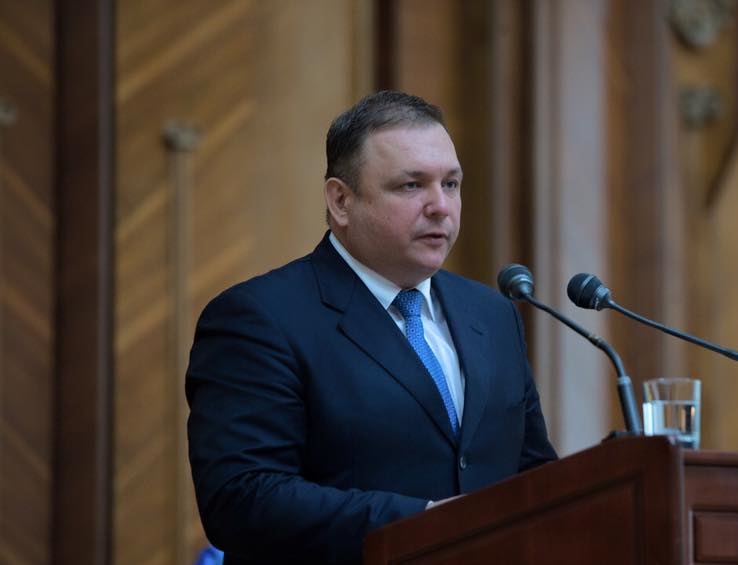Chairman of the Constitutional Court of Ukraine Stanislav Shevchuk paid a working visit to the Czech Republic
 Chairman of the Constitutional Court of Ukraine Stanislav Shevchuk took part in the preparatory meeting of the Circle of Presidents of the XVIIIth Congress of the Conference of European Constitutional Courts (CECC) and the International Conference on “Our Beginnings: Hans Kelsen´s Heirs” dedicated to the 25th anniversary of the Constitutional Court of the Czech Republic.
Chairman of the Constitutional Court of Ukraine Stanislav Shevchuk took part in the preparatory meeting of the Circle of Presidents of the XVIIIth Congress of the Conference of European Constitutional Courts (CECC) and the International Conference on “Our Beginnings: Hans Kelsen´s Heirs” dedicated to the 25th anniversary of the Constitutional Court of the Czech Republic.
During the preparatory meeting of Circle of Presidents of the XVIIIth CECC Congress, held on June 13, 2018 the participants discussed the procedure for holding the XVIIIth Congress, in particular topics and participants in the debate, reporting and other organisational issues. The theme of the Congress to be held in May 2020 in Prague, is "Human Rights and Fundamental Freedoms – the Interconnection of International, Transnational and National Catalogues in the 21st Century".
President of the Constitutional Court of the Czech Republic Pavel Rychetský reminded that in June 2017, following the meeting of the Circle of Presidents of European Constitutional Courts – full members of the Organisation - the governing body of the Conference, it was decided to hold the next XVIIIth and XIXth CECC Congresses in the Czech Republic and Republic of Moldova respectively and thanked the members of the Conference and their Presidents for their trust and support. He emphasised the importance of developing cooperation and intensifying the pan-European exchange of knowledge, ideas and experience. Only in this way, according to him, it is  possible to achieve a high level of protection of constitutional human and citizen’s rights on the continent.
possible to achieve a high level of protection of constitutional human and citizen’s rights on the continent.
During the visit, Chairman of the Constitutional Court of Ukraine Stanislav Shevchuk, took part in the international conference “Our Beginnings: Hans Kelsen´s Heirs”.
During the conference, the reports were presented by the Vice-President of the Constitutional Court of the Republic of Austria Christoph Grabenwarter (“Hans Kelsen - architect and judge of the Austrian Constitutional Court”), President of the Constitutional Court of the Slovak Republic Ivetta Macejková (“25 years of the activity of the Constitutional Court of the Slovak Republic – a few observations in retrospection”), Judge of the Constitutional Court of the Czech Republic Jan Filip (“Are We Hans Kelsen´s Heirs? Sources and Beginnings of Constitutional Judiciary within the Czech Republic´s Territorry”), President of the Constitutional Court of Spain Juan José González Rivas, President of the Federal Constitutional Court of Germany Andreas Vosskuhle (“Our Beginnings: Hans Kelsen´s Heirs – Development of the Federal Constitutional Court”), judge of the Constitutional Court of the Republic of Armenia Arevik Petrosyan (“Challenges of the Constitutional Development and the Role of the Constitutional Court in Ensuring Constitutionality in the Republic of Armenia”), President of the Constitutional Court of the Republic of Slovenia Jadranka Sovdat (“Kelsen's Legacy in Slovenia”), a member of the Constitutional Council of the French Republic Corinne Luquiens (“The Evolution of the Constitutional Council - from the regulation of the public authorities to the jurisdictionalisation”), President of the Constitutional Court of the Republic of Moldova Mihail Poalelungi (“Some historical information on the constitutional review in the Republic of Moldova”), Judge of the Constitutional Court of the Italian Republic Francesco Viganò (“Constitutional Courts as Mere Negative Legislators”).
It should be noted that the theme of the international conference was chosen not by chance, since Hans Kelsen had made a significant contribution to the theory and practice of the world constitutional control. His ideas influenced the foundation of modern European model of constitutional justice. Hans Kelsen proved that the formation of constitutional jurisdictions does not contradict either the theory of separation of powers or the doctrine of sovereignty. He was convinced that a special body of constitutional jurisdiction, endowed with functions of the fourth power, would not become its bearer in the full sense, since it would only play a role of counterbalance or a negative legislator. The speakers' reports were followed by lively discussions.

